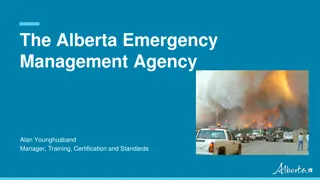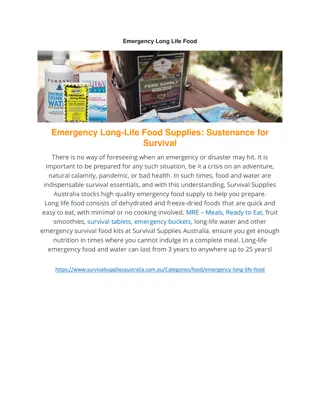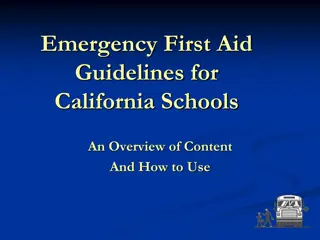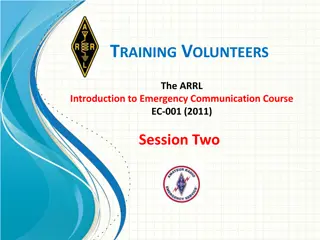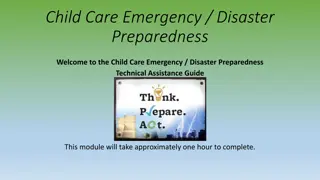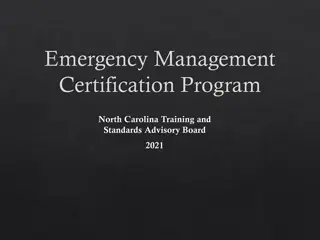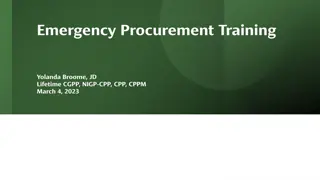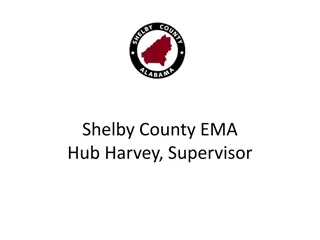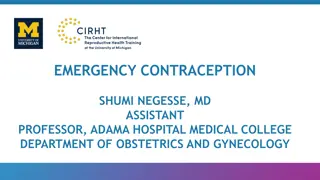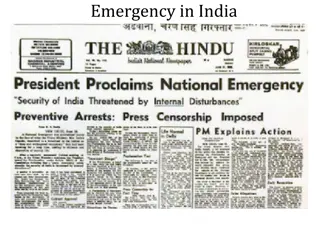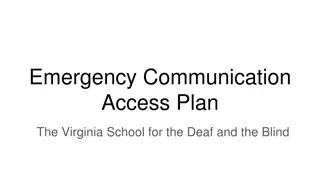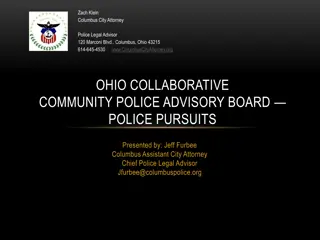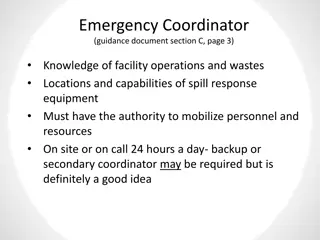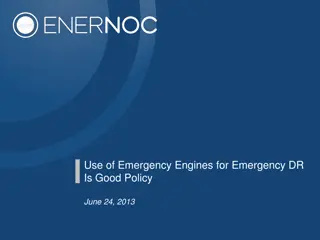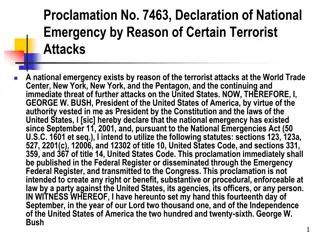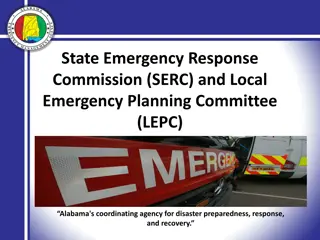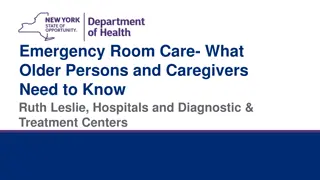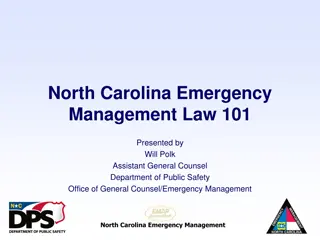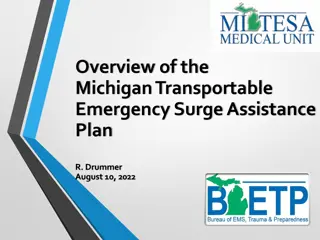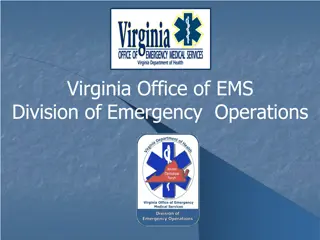Actions Emanating from the Evaluation of the Governance Reform
The evaluation of the governance reform within the WMO aimed to assess its alignment with strategic objectives, effectiveness in responding to societal needs, coordination efficiency, decision-making process, agility, and more. Evaluation criteria included relevance, design validity, effectiveness,
1 views • 13 slides
Alberta Emergency Management Agency Overview
The Alberta Emergency Management Agency (AEMA) is dedicated to providing strategic leadership in emergency management and business continuity in Alberta. AEMA collaborates with partners and stakeholders to enhance disaster resilience in the region. The agency's structure includes the Managing Direct
3 views • 19 slides
Emergency Response Proposed Rule - Worker Safety and Health Conference
The Emergency Response Proposed Rule aims to update regulations for worker safety and health, expanding coverage to include technical search and rescue and emergency medical service entities. The rule proposes replacing the existing Fire Brigades standard with an Emergency Response standard. Federal
2 views • 23 slides
Enhancing Emergency Management Capabilities in Kansas: Administration of HMEP Grant
Kansas Division of Emergency Management (KDEM) oversees the administration of various grant programs aimed at building sustainable emergency management capabilities across all phases. Challenges and solutions in grant management, fund allocation priorities, subgrant application components, and progr
2 views • 15 slides
Emergency Long Life Food (Emergency Long-Life Food Supplies: Sustenance)
There is no way of foreseeing when an emergency or disaster may hit. It is important to be prepared for any such situation, be it a crisis on an adventure, natural calamity, pandemic, or bad health. In such times, food and water are indispensable survival essentials, and with this understanding, Sur
1 views • 1 slides
Emergency Medical Technician Program Details
This program offers a one-year Emergency Medical Technician (EMT) education with courses in College/Career Readiness, CPR/Basic Cardiac Life Support, Emergency Medical Responder, Basic Emergency Medical Technology, Applied Practical Studies, and Emergency Medical Technology Practicum. The schedule,
0 views • 33 slides
Universal Evaluation Framework: Simplifying Evaluation Processes
This session introduces the Universal Evaluation Framework (UEF) developed for evaluating QAA Scotland Enhancement Themes. Participants learn key evaluation questions, evidence capture, and the Theory of Change to enhance evaluation confidence. The QAA Scotland Evaluation Odyssey details historical
2 views • 14 slides
Affordable-Emergency-Dentist-Near-Me
Affordable Emergency Dentist Near Me\n\nExperiencing a dental emergency can be stressful and painful. Fortunately, there's a solution: Dental & Implant Centers of Colorado. We offer comprehensive emergency dental care at an affordable price. We're co
1 views • 6 slides
Emergency First Aid Guidelines for California Schools
These guidelines provide essential information on emergency procedures, when to call 9-1-1, infection control, emergency planning, special needs considerations, recommended first-aid equipment, and emergency contact numbers. The content is presented in alphabetical order with tabs and flow charts fo
0 views • 29 slides
Implementing Blind Evaluation Pilot in HORIZON EUROPE: Key Facts and Process
HORIZON EUROPE is conducting a pilot on Blind Evaluation in the 2023-2024 work program to address biases in the research and innovation evaluation process. The pilot aims to assess the feasibility of blind evaluations in ensuring fairness and mitigating potential biases towards well-known organizati
9 views • 9 slides
Emergency Communication Volunteer Training Overview
Introduction to Emergency Communication course covers a wide range of topics including net operations, net types, example net formats, net missions, and more. Participants will learn about the importance of structured communication networks during emergencies and disaster situations. The training em
1 views • 15 slides
Exploring Developmental Evaluation for Better Decision-Making
Delve into the realm of developmental evaluation, focusing on its purpose, principles, and application in practice. Understand how developmental evaluation emphasizes real-time data collection for informed decision-making in complex systems. Learn about key principles such as developmental purpose,
0 views • 25 slides
Child Care Emergency/Disaster Preparedness Guide
This technical assistance guide provides comprehensive information on emergency and disaster preparedness for child care facilities, covering topics such as evacuation planning, required components, regulations, and resources. It includes multimedia enhancements, sample forms, and helpful links to a
1 views • 31 slides
Emergency Management Certification Program in North Carolina
The Emergency Management Certification Program by the North Carolina Training and Standards Advisory Board for 2021 entails a two-tiered process involving Associate and Executive Emergency Manager designations. Educational requirements range from a high school/GED for Associates to a Bachelor's degr
0 views • 18 slides
Emergency Procurement Procedures and Definitions for Public Safety
Understanding emergency procurement procedures is crucial in situations where immediate action is required to address threats to public health, welfare, or safety. This includes making emergency procurements for equipment, supplies, services, construction items, or professional/consultant services u
0 views • 12 slides
Enhancing Evaluation Capabilities in Mongolia for Agenda 2030
The Mongolian Evaluation Network in collaboration with UNDP is working to integrate the 2030 Agenda into national strategies and plans, establish institutional coordination mechanisms, align budgets, and enhance data monitoring systems. Key stakeholders including government agencies, NGOs, and inter
0 views • 9 slides
Emergency Planning and Response in Shelby County
Shelby County Emergency Management Agency (EMA) Hub, under the supervision of Supervisor Harvey, plays a crucial role in local emergency planning and response. The Local Emergency Planning Committee (LEPC) focuses on building strong relationships to ensure local success. Recent amendments to the Eme
0 views • 5 slides
Emergency Contraception Overview: Types, Usage, and Effectiveness
This presentation by Dr. Shumi Negesse provides an in-depth look at emergency contraception, including its definition, types of emergency contraceptives available, when to prescribe them, common side effects, and their effectiveness. The audience will learn about different emergency contraceptive pi
0 views • 23 slides
Understanding Evaluation in Education
Evaluation in education is a comprehensive term that encompasses measurement, testing, and qualitative examination of student behavior. It involves both quantitative and qualitative descriptions, along with value judgments. Differentiating from mere measurement, evaluation provides a deeper analysis
0 views • 28 slides
Emergency Provisions in the Indian Constitution: A Historical Overview
The emergency provisions in the Indian Constitution, including National/War Emergency under Article 352 and Constitutional Emergency in States under Article 356, have had significant historical implications. The period of Emergency declared from June 25, 1975, to March 21, 1977, during Indira Gandhi
0 views • 7 slides
Sustainable Evaluation Systems Workshop Summary
Workshop on Sustainable Evaluation Systems by Stephen Porter at the NEC Conference focused on defining evaluation systems, addressing their failures, and emphasizing the importance of quality, use, and networks in achieving sustainability. Participants engaged in activities such as bingo card introd
0 views • 38 slides
Enhancing Emergency Communication Access Plan at Virginia School for the Deaf and the Blind
Virginia School for the Deaf and the Blind (VSDB) is taking steps to improve its emergency communication access plan to ensure all individuals on campus, including those who are deaf, hard of hearing, blind, or vision impaired, have full access to emergency alerts and instructions. The plan includes
2 views • 14 slides
Ohio Revised Code Sections on Emergency Vehicle Regulations
Explore the Ohio Revised Code sections pertaining to emergency vehicles, covering exemptions for emergency vehicle drivers in response to emergency calls, procedures for proceeding past red signals, and speed limit exceptions. These regulations ensure that emergency vehicles can navigate safely whil
0 views • 21 slides
Essential Emergency Coordinator Guidelines for Facilities
This guidance document outlines the key responsibilities and requirements for an emergency coordinator at a facility. It covers the knowledge needed for facility operations, spill response equipment, authority to mobilize resources, and protocols for handling fire, spills, and other incidents. Addit
0 views • 7 slides
Impact and Evaluation Toolkit for Churches and Christian Charities
This toolkit aims to equip churches and Christian charities engaged in small-scale social action projects to think about impact, measure impact, choose data tools, reflect on evaluation data, and use it effectively. It covers principles of evaluation, setting objectives, selecting indicators, storyt
0 views • 34 slides
Overview of Monitoring and Evaluation in the GEF
The Evaluation in the GEF and Training Module focuses on promoting accountability and learning within the Global Environment Facility (GEF) through monitoring and evaluation activities. The GEF Independent Evaluation Office plays a crucial role in assessing results, effectiveness, and performance of
0 views • 25 slides
Analysis of Emergency Engines and Ozone Levels in Demand Response Events
Use of emergency engines in demand response (DR) events does not correlate with high ozone levels, as shown by a study conducted from 2005 to 2011 across various regions like PJM, ISO NE, NYISO, and ERCOT. The analysis reveals that emergency DR events do not align with high ozone days, indicating no
0 views • 12 slides
Understanding National Emergency Declarations and Emergency Powers Laws
This content delves into the legal aspects of national emergency declarations, emergency powers laws, and judicial review of emergency declarations. It covers the purpose, termination, historical context, congressional oversight, and impact on presidential powers. It also explores the complexities o
0 views • 6 slides
Emergency Location Working Group Initiatives and Standards
The Emergency Location Working Group focuses on securely providing accurate location information for emergency calls in the UK. They address standards, publications, and current focus areas such as ETSI architecture review and protocols for locating VoIP emergency calls. The group collaborates with
0 views • 6 slides
Developing an Evaluation Work Plan for Effective Program Assessment
This presentation by Amy D. Andrade from San Jose State University focuses on developing an Evaluation Work Plan to identify responsibilities and timelines. It covers topics such as Evaluation Coaching Support, Webinar Outlines, Logic Model, Inputs-Outputs-Outcomes, Two Approaches to Evaluation, Pro
0 views • 29 slides
A-29 Emergency Landing Gear Procedure
This emergency procedure outlines steps to follow in case of low pressure in the landing gear accumulator of the A-29 aircraft. It details actions to take for the emergency gear situation, including the response for low emergency brake accumulator pressure and the procedure to follow when the landin
0 views • 4 slides
Evaluation Synthesis in Changing Contexts: Enhancing Knowledge for Development Effectiveness
Evaluation synthesis is crucial for promoting learning, reflection, and decision-making in development work. This process involves bringing together diverse knowledge sources to generate strategic insights and facilitate wider use of evaluation findings. The Independent Office of Evaluation of IFAD
0 views • 20 slides
Evaluation of FME Zero Emission Neighbourhoods in Smart Cities
The mid-term evaluation process of FME Zero Emission Neighbourhoods in Smart Cities involves self-evaluation, partner evaluation, and panel evaluation. The procedure includes scientific review, evaluation by scholars, and innovation assessment. Key documents like self-reports, progress reports, and
1 views • 20 slides
Overview of Regular Evaluation 2017 Findings in Estonia
In the Regular Evaluation 2017, efforts were made to maximize the benefits of evaluation outcomes for various stakeholders in Estonia such as the state, society, and institutions. The evaluation focused on a range of actions including preparing legislation, finding experts, creating self-report form
0 views • 6 slides
Alabama State Emergency Response Commission (SERC) and Local Emergency Planning Committee (LEPC)
Alabama's State Emergency Response Commission (SERC) and Local Emergency Planning Committee (LEPC) are key agencies responsible for disaster preparedness, response, and recovery. The SERC, formed by Executive Order Number 4, appoints agencies like the Alabama Emergency Management Agency (AEMA) and A
0 views • 14 slides
Essential Guide to Emergency Room Care for Older Persons and Caregivers
Older persons and their caregivers need to be well-informed about emergency room care. This guide covers key aspects such as services provided in emergency departments, differences between emergency, inpatient, and outpatient care, observation billing, what to bring to the ED, and the CARE Act for c
0 views • 14 slides
Comprehensive Guide to Training Evaluation Methods
This detailed guide covers the aim of evaluation, evaluation methods, techniques of evaluation, types of evaluation (formative, process, outcome, impact), and the significance of formative and process evaluation in assessing training effectiveness. Learn about the key principles and practices involv
0 views • 45 slides
Understanding North Carolina Emergency Management Law 101
The North Carolina Emergency Management Law 101, presented by Will Polk, Assistant General Counsel, delves into the measures taken by governments and the populace at various levels to minimize the adverse effects of emergencies. The law covers the planning, prevention, mitigation, warning, movement,
0 views • 46 slides
Michigan Transportable Emergency Surge Assistance Plan Overview
Michigan Transportable Emergency Surge Assistance (MI-TESA) Plan is a state resource established for emergency preparedness, featuring a mobile field hospital with various facilities and equipment stored strategically in Michigan. The primary healthcare mission of MI-TESA is to augment existing heal
0 views • 14 slides
Virginia Office of EMS Division of Emergency Operations
The Virginia Office of EMS Division of Emergency Operations is a crucial entity responsible for coordinating responses to various emergencies, including natural disasters, man-made incidents, and public health crises. Led by dedicated staff members, the division focuses on strategic initiatives to e
2 views • 21 slides

